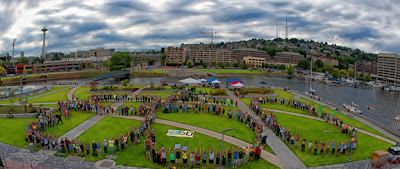Seattle Pacific University professor and former Earth Letter Editor Doug Thorpe shares a moving contemplation of the power of water in the Holy Land, as he experienced it on an Earth Ministry eco-justice trip to Israel, Palestine and Jordan in January, 2009. The following excerpt was featured in the April 2011 Edition of Soujourners Magazine.
By: Doug Thorpe
Former
Earth Letter Editor

"I lay myself down in the Dead Sea waters. It's the middle of January and I’m travelling with a group led by Earth Ministry, a nonprofit based in Seattle that works in the area of faith and the environment. We're in Israel/Palestine for the usual reasons -- a pilgrimage to holy sites -- but also to learn more about the water situation.
So I float in a shrinking Dead Sea. I put my hands into a polluted Jordan River.
Symbols are alive in the Holy Land, even if their source is dying.
For millions of people, the power of this river and land is evoked in the lyrical language of the Bible, which has made the Jordan River one of the world's great symbols. In these texts, just as the land is more than just another piece of property, water is never simply water. Here the waters sing in poetry.
It's not that the biblical images are simply poetry: All of us are on this trip because there is a genuine water crisis in this region. Too often we hear that the next war here will be over water. But this crisis, which includes not just how well humans are living with each other, but how well they are living on the land, is connected to the loss of a sense of water's "mystique," as Thomas Berry calls it. The mystique of the water here comes partly from the poetry -- and it's something that we lose the moment we think we control it.
The irony is that there's a dream in these scriptures of coming home to this place, but the attempt to literalize that dream has taken a gift and locked it up behind a wall.
One morning early in the trip, I awake at 4:30 in Nazareth and lie in bed as the birds begin to sing, as a chant rises from a nearby mosque. I turn on the light and begin to read from Psalm 46:
There is a river whose streams make glad the city of God, the holy habitation of the Most High. God is in the midst of her, she shall not be moved. When I am at the Jordan, it is a holy day for Syrian Christians; both banks are lined with celebrants and priests, some in Israel, some in Jordan. They can see one another, even shout to one another across the 10-foot-wide stretch of the river. What they can't do is cross it. I walk down to the bank past a soldier and cup my hands in the still water. I say a prayer for my brother, dying from a stroke in a hospital in Chicago, and another for this place and these people. I let the water run through my fingers. I do not drink.
We travel about the countryside and through the villages. We listen to stories from Christian Palestinians, including Samuel Barhoum, an Anglican priest near Nazareth, and Sami Awad of the Holy Land Trust, a nonprofit based in Bethlehem that uses nonviolence tactics in support of Palestinian farmers. Both speak at length of going for days without water -- no water for bathing or for cooking, little for drinking -- while they can see Israeli settlements in the West Bank with swimming pools. We travel down to the Dead Sea, where we meet with Gundi Sachal, Middle East regional director for Friends of the Earth. We hear of (and see in front of us) the shrinking of the Dead Sea. Gundi confirms what we saw days before, and what I’ve also heard from Susan Koppelman, a young Jewish-American woman who works with the nonprofit initiative LifeSource in the West Bank: The Jordan River is now mostly untreated sewage, with 5 percent of its historical flow reaching the sea here. Lebanon, Syria, and Israel all cut into it. The Dead Sea drops a meter every year.
We float in the warm water. We sink our feet into the famous mud.
In both the Hebrew Bible and the New Testament, we hear the beautiful phrase "living water." But it's important to know that, when the scriptures use this phrase, it means fresh water that hasn’t been controlled by human action: Living water is a direct gift from God.
We may wish to dismiss this distinction; after all, the water that most of us in this country get from our taps is pure in some literal sense (as is the "pure spring water" that we drink from plastic bottles). But anyone who has drunk from a mountain stream on a hot day knows the difference, as does anyone who has done any research at all on the bottled water industry: Such water's claim of purity leaves out the "living" quality -- that mystique -- as well as the human and environmental cost. And these omissions are of course connected. We substitute the poetry of marketing for the poetry of water.
Read the original story from Soujourners Magazine, April 2011.






























